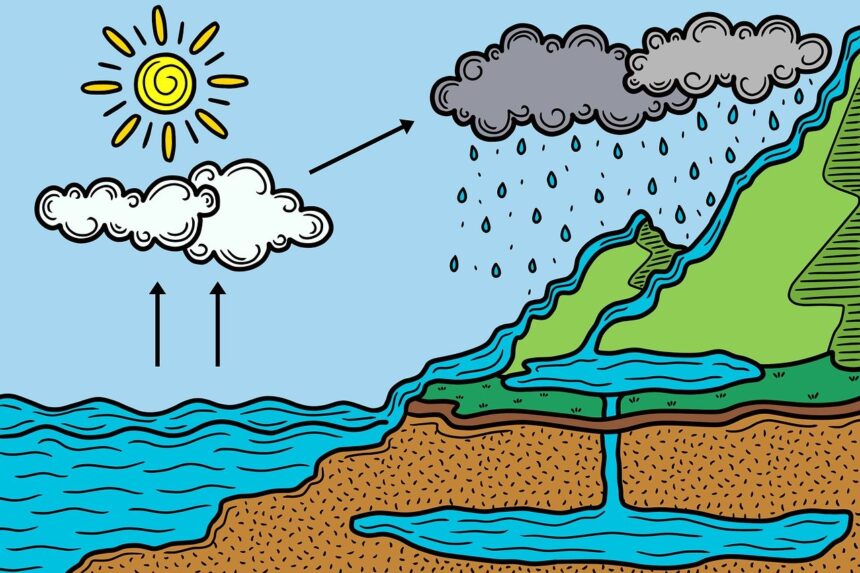Photo by Bucarama-TLM on Pixabay
Rain, a natural phenomenon that brings life to Earth and influences the climate, is a topic of fascination for many. This article will explore the science behind rain formation and its integral role in the Earth’s water cycle.
The Water Cycle: An Overview
The Earth’s water cycle, also known as the hydrologic cycle, is a continuous process where water evaporates, travels into the air, cools and condenses into clouds, and falls back to the surface as precipitation. This cycle is the foundation of rain formation and plays a crucial role in distributing heat across the planet.
Evaporation: The Beginning of the Journey
Water begins its journey in the water cycle through the process of evaporation. The sun’s heat energy causes water from oceans, rivers, and lakes to transform into water vapor. This gaseous form of water then rises into the atmosphere.
Transpiration: Nature’s Contribution
Plants also contribute to the water cycle through a process known as transpiration. As plants photosynthesize, they release water vapor into the atmosphere from their leaves, adding to the moisture content in the air.
Condensation: Formation of Clouds
As water vapor rises higher into the atmosphere, the cooler temperatures cause it to condense onto tiny particles of dust or other aerosols. These condensed water droplets cluster together to form clouds.
The Birth of Rain: A Closer Look
Rain is a form of precipitation, which includes all forms of water, liquid or solid, that fall from clouds to the Earth’s surface. But how exactly is rain formed within clouds?
Collision and Coalescence: Growing Droplets
Within a cloud, water droplets collide and coalesce, or merge, to form larger droplets. As these droplets continue to grow, they eventually become too heavy to remain suspended in the cloud.
Falling to Earth: The Final Stage
These large, heavy droplets then fall to the Earth’s surface due to gravity. The droplets we perceive as rain are often a conglomeration of many smaller droplets.
More than Just Rain: Other Forms of Precipitation
Rain is not the only form of precipitation. Snow, sleet, and hail are also products of the water cycle and cloud formation processes.
Snow: A Winter Phenomenon
When the temperature within a cloud and all the way to the ground is freezing or below, water vapor in the cloud forms ice crystals. These ice crystals fall to the ground as snow.
Sleet and Hail: The Role of Temperature Fluctuations
Sleet and hail are formed when layers of the atmosphere within the cloud, and between the cloud and the ground, alternate between warmer than freezing and colder than freezing temperatures.
Hail: A Layered Ice Ball
Hail is formed when a snowflake falls through a warmer part of a cloud, gets coated with water, and then freezes again as it’s tossed back into a colder part. This process can repeat several times, creating multiple layers of ice on the snowflake. When it becomes too heavy to stay suspended in the cloud, it falls to the ground as hail.
Sleet: Miniature Ice Pellets
Sleet, on the other hand, occurs when snowflakes melt into raindrops as they pass through a layer of warm air, and then refreeze into ice pellets as they fall through a layer of subfreezing air near the ground.
The Role of Satellites in Understanding Rain
Satellites play a crucial role in helping scientists understand the formation of rain and other precipitation. They provide valuable data about cloud formation, precipitation, and weather patterns.
Geostationary Operational Environmental Satellites (GOES)
The Geostationary Operational Environmental Satellites (GOES) series provides continuous imagery and atmospheric measurements of Earth’s Western Hemisphere. They aid meteorologists in understanding and predicting changes in weather patterns, including the formation and movement of precipitation.
Global Precipitation Measurement Mission
NASA’s Global Precipitation Measurement (GPM) mission provides data about rain and snow worldwide every three hours. This information aids in understanding Earth’s water cycle, weather and climate patterns, and water resource management.
The Aftermath of Rain: Measuring Precipitation
Precipitation, including rain, is measured in terms of the depth of water that falls on a level surface without soaking in. This measurement is made using a device known as a rain gauge, which collects and measures the amount of liquid precipitation over a set period.
The Impact of Rain: More than Just Wet Ground
Rain is not just a natural phenomenon; it has significant impacts on various aspects of our lives and the environment.
Agriculture: A Lifeline for Crops
Rain is crucial for agriculture, providing the necessary water for crops to grow. Without it, farmers would have to rely entirely on irrigation, which is not always feasible or sustainable.
Ecosystems: Supporting Biodiversity
Rain also supports biodiversity by creating and maintaining habitats for a wide variety of plant and animal species. Different amounts and intensities of rainfall can create different types of habitats, from arid deserts to lush rainforests.
Climate: A Key Player
Rain also plays a vital role in the Earth’s climate. It helps distribute heat around the planet, affecting temperature patterns and weather systems. The amount and distribution of rain can also be impacted by climate change, creating a feedback loop between precipitation and climate.


